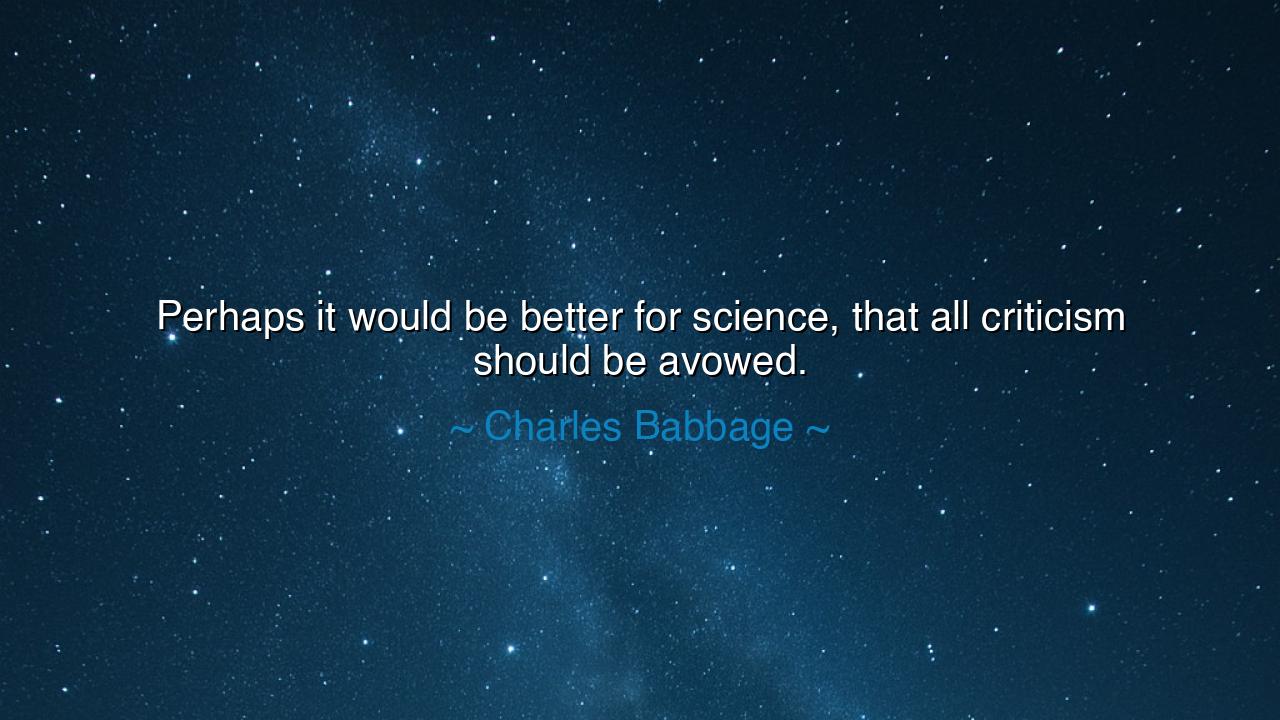
Perhaps it would be better for science, that all criticism should






Hear me, O Seekers of Wisdom, for the words of Charles Babbage hold great truth about the nature of science and the importance of criticism: "Perhaps it would be better for science, that all criticism should be avowed." These words speak to the core of scientific inquiry—a pursuit that thrives not on certainty and affirmation, but on the honest exchange of ideas, the challenge of assumptions, and the acknowledgment of weaknesses. To embrace criticism in its fullest form is not to weaken science, but to strengthen it—providing the fertile soil in which new ideas can grow, unshackled by the limitations of pride or fear.
In ancient times, the greatest minds knew that truth could not be obtained by shielding oneself from challenge. Socrates, the great philosopher of Athens, famously said, "The unexamined life is not worth living." In his relentless pursuit of wisdom, he welcomed criticism and questioning from all who encountered him. He did not shy away from debate or dissent but saw criticism as an essential part of intellectual growth. Through his dialectic method, he encouraged others to question their assumptions, to test their beliefs, and to refine their understanding through open dialogue. Babbage’s words are in alignment with this ancient vision: criticism is not an enemy of science; it is its ally, a force that sharpens and refines, guiding us closer to the truth.
Let us reflect upon the story of Galileo Galilei, who, with his telescope, turned his gaze to the heavens and challenged the geocentric view of the universe. His observations, which showed that the Earth was not the center of the universe, were met with fierce opposition by the church and other authorities of his time. Yet, Galileo did not retreat in the face of such criticism. He embraced the challenge, understanding that science is not about being shielded from critique, but about welcoming it and using it to refine one’s understanding of the world. In this way, Galileo exemplified Babbage’s vision: that criticism, when acknowledged and examined, advances science and brings us closer to the truth.
Babbage’s insight about criticism highlights the importance of openness in the pursuit of knowledge. Science, at its core, is a quest for truth, and that truth cannot be discovered through complacency or by avoiding challenges. Whether in the laboratory, the classroom, or the fields of inquiry, the willingness to be criticized—and to accept that criticism—is essential to the advancement of science. Just as Socrates and Galileo welcomed the questioning of their ideas, so too must we embrace the rigorous process of testing, challenging, and rethinking our beliefs. It is only through this process that science can evolve and adapt, pushing the boundaries of what we know and uncovering new truths about the world.
Consider, O Children, the story of Charles Darwin, whose theory of evolution by natural selection revolutionized our understanding of life on Earth. When Darwin first proposed his theory, it was met with skepticism and vehement criticism from many quarters. Yet, rather than retreating in the face of opposition, Darwin engaged with his critics, refining and strengthening his ideas through years of further research and debate. The criticism he faced did not break him; it spurred him on to clarify and expand upon his theory, ultimately leading to one of the most profound shifts in the scientific understanding of life. This, too, exemplifies Babbage’s point: science flourishes not when it is immune to criticism, but when it is willing to embrace it and use it to propel the search for truth.
The lesson here, O Seekers, is that criticism is not to be feared, but welcomed. In your own lives, whether in science, art, or any pursuit of knowledge, seek out the challenges, the questions, and the voices that may criticize you. Let them be the sharp instruments that refine your understanding, that push you to examine your assumptions, and that lead you toward a deeper and more complete understanding of the world. Understand that criticism is not a personal attack, but a necessary part of the journey toward truth and growth. Without it, we would remain stagnant, trapped in the limitations of our own ideas and beliefs.
In your journey of knowledge, remember the wisdom of Babbage: science is best advanced when all criticism is avowed—openly acknowledged, examined, and used to improve the work at hand. Be brave in the face of challenge, and remember that the true strength of science lies in its ability to adapt, to question, and to evolve. Let criticism be your guide, not your adversary, and may it lead you to greater understanding and wisdom. Just as the great minds of the past embraced the scrutiny of their ideas, so must you accept and seek out the critical voices that will help you grow and refine your own understanding of the world.






AAdministratorAdministrator
Welcome, honored guests. Please leave a comment, we will respond soon